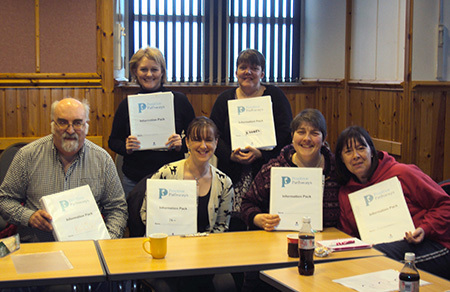Positive Pathways draws to a close
 We are nearing the end of Positive Pathways as Marie Thomson and Caroline Shaw from the Positive Behaviour Support Team head out across Scotland to carry out their last few workshops.
We are nearing the end of Positive Pathways as Marie Thomson and Caroline Shaw from the Positive Behaviour Support Team head out across Scotland to carry out their last few workshops.
The course gave carers training around autism and positive behaviour support with the focus on interventions that they can take home and use with their families. The last round of the workshops is focused on managing difficult times and looking to where the family carers can get support and help in the future.
Both Caroline and Marie feel that the programme has been valued by the families they have been working with; they have spoken about their relief in finding this course as there is so little available for families of adults on the autism spectrum. Everyone who attended the course will complete a carers evaluation which will gather information about how the carers have felt about the training, how their knowledge has increased and also look at how much the lives of the people they are caring for have changed.
Anecdotally, both Caroline and Marie have been receiving positive feedback after each workshop via email about plans and techniques that the family carers have tried. Even simple techniques added to a greater understanding of how their family members with autism view the world, have made a difference to some families. One of the workshops was about the sensory differences that people with autism and Asperger's syndrome can have and the feedback was really positive:
"The information on the differences in sensory experiences was something I had not fully realised. So, this made me far more observant of Luke’s likes and dislikes and it has helped me to understand him even more."
"The area that I focused on following our last workshop was Mark’s sensitivity and dislike of toothbrushes. Over the years I have tried all sorts of brushes and nothing has suited him, as a result his oral hygiene is very poor, however what I did try was the suggestion of using an electric toothbrush which sounds loud and feels hard. This has made such a difference as Mark feels more comfortable brushing his teeth and his oral hygiene has improved."
Learning more about sensory difference helped people at the workshops to have a different perspective on their family members with autism and reconsider what life is like from their perspective.
After the workshop on communication, we had some positive feedback about how some of the ideas from the session had helped a mother and her daughter Yvonne.
"I was trying to prepare Yvonne for a Church service where a lady Susan, whom Yvonne has real issues with, would be attending. Yvonne has terrible trouble coping with the sounds that Susan makes (she has no speech) and Yvonne will often shout and scream as a result of being in her presence."
"This has been going on for months and really does affect everyone who is at the service and is very stressful for me. I tried the ‘power card’ tool, using her fascination with Luke Skywalker to go through how Luke would cope with Susan making the noises she makes and what he would do, and talking at great length about this as one of Luke’s good qualities that Yvonne could copy."
"To my utter amazement (and that of the group) it worked! Yvonne did not turn round once during the service when Susan started making noises. My flabber has never been so gasted! I cannot thank you enough for suggesting the technique."
Throughout the time we have been running the Positive Pathways programme we have continued to receive enquiries from more parent carers about how to get involved. We have also had enquiries from general practitioners, social workers and psychologists about how they can refer people to do the training. This demonstrates the ongoing need for good quality behavioural training for family carers of people with autism - in order to offer carers the maximum support in carrying out their caring role, often in difficult and challenging circumstances.
Commenting is now closed on this article.